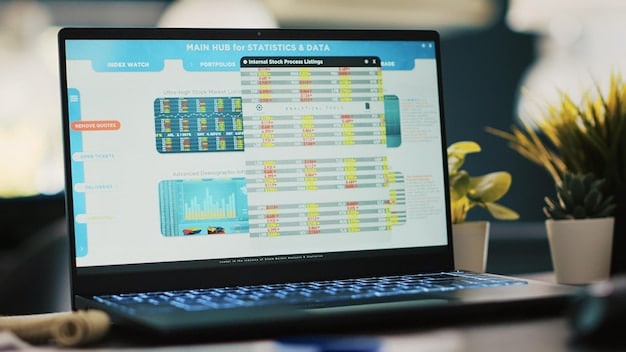Zero-Based Budgeting 2025: A Practical Guide for Every Dollar

Zero-based budgeting is a method where every expense must be justified for each new period, starting from a “zero base,” offering greater control over finances for individuals aiming to allocate every dollar effectively in 2025.
Are you ready to take complete control of your finances in 2025? Zero-based budgeting (ZBB) provides a powerful framework for allocating every dollar intentionally, starting from scratch each budget cycle. This isn’t just about tracking expenses; it’s about making conscious decisions about where your money goes.
Understanding Zero-Based Budgeting
Zero-based budgeting might sound intimidating, but the core concept is simple: you justify every expense from zero. Unlike traditional budgeting, where you adjust previous budgets, ZBB requires a fresh evaluation of all spending. This method promotes financial mindfulness and ensures that every dollar aligns with your priorities.
The Principles of Zero-Based Budgeting
ZBB isn’t just a method; it’s a mindset. Here’s what it entails:
- Starting from Zero: Each budget cycle begins with a clean slate, forcing you to justify every expense.
- Justifying Every Expense: You must explain why each expense is necessary, ensuring that your spending aligns with your goals.
- Prioritizing Needs vs. Wants: ZBB helps you differentiate between essential needs and discretionary wants.
- Regular Review: Consistent evaluation of your budget is crucial for maintaining control and making necessary adjustments.
<
With Zero-Based Budgeting you are able to take control of you finances and have greater control over your spending and income. With ZBB it is possible to focus on your goals and achieve them quicker.

Setting Up Your Zero-Based Budget for 2025
Implementing ZBB requires careful planning and execution. Here’s how to set up a zero-based budget for 2025, focusing on practical steps and considerations to ensure that every aspect of your financial planning is accounted for.
Steps to Create Your Budget
Zero-based budgeting can sound like a burden, but creating one can be a piece of cake if it is done properly.
- Calculate Your Income: Determine your total income for the budget period. This includes salary, investments, and any other sources of revenue.
- List All Expenses: Identify every possible expense, from fixed costs like rent and utilities to variable costs like groceries and entertainment.
- Categorize Expenses: Organize your expenses into categories such as housing, transportation, food, and savings.
- Justify Each Expense: Evaluate the necessity of each expense, deciding whether it’s a need or a want. Prioritize needs and cut unnecessary wants.
Tools and Resources for Effective Budgeting
To make zero-based budgeting easier, use a variety of tools and resources designed to streamline the process. From budgeting apps to spreadsheet templates, here’s how technology can assist you in allocating every dollar efficiently in 2025.
Leveraging Technology for Budgeting
Technology offers numerous tools to help you manage your zero-based budget effectively:
- Budgeting Apps: Apps like YNAB (You Need A Budget) and Mint offer features specifically designed for ZBB.
- Spreadsheet Templates: Customizable templates in Excel or Google Sheets can help you track income and expenses.
- Expense Trackers: Mobile apps that automatically track your spending can provide valuable insights into your spending habits.
Recommended Resources
To become proficient with zero-based budgeting, consider using these resources:
With online resources being so widely avaliable, using them for better understanding and management is always a good idea. If you are looking for a better way of dealing with finances, look no further than those online educational resources.

Common Challenges and How to Overcome Them
Implementing zero-based budgeting isn’t always smooth sailing. You might encounter challenges like unexpected expenses, difficulty in justifying certain costs, or the temptation to overspend. Here’s how to tackle these issues and stay on track.
Addressing Budgeting Hurdles
How to stay commited to your zero-based budget:
- Unexpected Expenses: Create an emergency fund to cover unforeseen costs without derailing your budget.
- Difficulty in Justifying Costs: Regularly re-evaluate expenses to ensure they align with your priorities and goals.
- Temptation to Overspend: Use visual aids like charts and graphs to monitor spending and stay motivated.
- Inconsistent Tracking: Commit to daily or weekly tracking to maintain accuracy and avoid overlooking expenses.
Financial planning is always a hard part when managing your money in a healthy way. Using the correct tools and sticking to the previously prepared plan is the best way of facing challenges and achieving financial stability.
Adapting Zero-Based Budgeting to Your Lifestyle
A zero-based budget isn’t a one-size-fits-all solution. It should adapt to your unique lifestyle, financial goals, and personal values. Tailoring ZBB to your specific needs ensures that it remains a sustainable and effective tool.
Personalizing Your Budget
Consider these factors when customizing your zero-based budget:
Budgeting can sometimes be difficult, but tailoring it to your everyday needs and requirements, can make all the process much more easier and straightforward. It is important to review and possibly change some aspects of your plan, to suit you better.
Advanced Strategies for Zero-Based Budgeting
Once you’ve mastered the basics, explore advanced strategies to optimize your zero-based budget. Techniques like setting specific financial goals, automating savings, and negotiating expenses can significantly enhance your financial control. Here are some insights for refining your approach.
Optimizing Your Financial Control
There are some actions that you can take to optimize your financial control:
- Setting Specific Financial Goals: Define clear, measurable goals like saving for a down payment or paying off debt.
- Automating Savings: Set up automatic transfers to savings accounts to ensure consistent progress.
- Negotiating Expenses: Regularly negotiate bills and subscriptions to reduce recurring costs.
- Tracking Progress: Monitor your financial progress using tools like budget journals and financial dashboards.
You should always strive for the best possible way of money allocation, so that you are satisfied the most. If you are ever struggling and can’t make a reasonable choice, always ask for advice from experts with experience in financial planning.
| Key Point | Brief Description |
|---|---|
| 💰 Starting from Zero | Begin each budget cycle with no assumptions about previous expenses. |
| 📊 Justify All Expenses | Explain and justify the necessity of every expense in the budget. |
| 🎯 Prioritize Needs | Focus on essential needs versus discretionary wants. |
| 🔄 Regular Review | Consistently evaluate and adjust the budget as needed. |
FAQ
▼
Zero-based budgeting is a method where you start from a “zero base” each budget cycle and must justify every expense, rather than adjusting previous budgets.
▼
Unlike traditional budgeting, zero-based budgeting requires you to justify every expense anew, instead of simply adjusting the previous budget.
▼
The benefits include increased financial awareness, better control over spending, and alignment of expenses with your priorities.
▼
You can use budgeting apps like YNAB and Mint, or spreadsheet templates in Excel or Google Sheets to track your income and expenses.
▼
Tailor your budget to your unique financial goals, personal values, and spending habits to ensure it remains sustainable and effective.
Conclusion
Zero-based budgeting offers a transformative approach to financial management, empowering you to allocate every dollar intentionally. By understanding its principles, setting up your budget strategically, and adapting it to your lifestyle, you can achieve greater financial control and work towards your goals with confidence.





